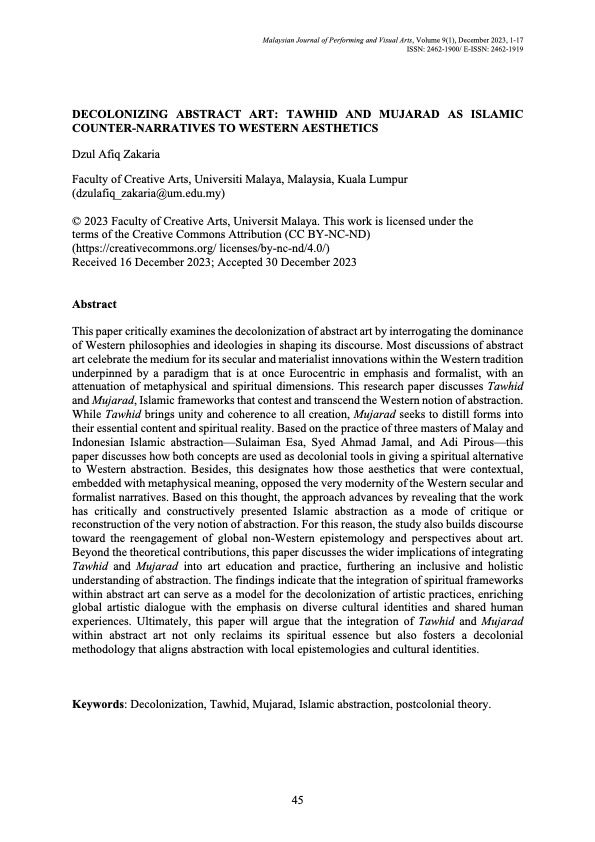DECOLONIZING ABSTRACT ART: TAWHID AND MUJARAD AS ISLAMIC COUNTER-NARRATIVES TO WESTERN AESTHETICS
Keywords:
Decolonization, Tawhid, Mujarad, Islamic abstraction, postcolonial theory.Abstract
This paper critically examines the decolonization of abstract art by interrogating the dominance of Western philosophies and ideologies in shaping its discourse. Most discussions of abstract art celebrate the medium for its secular and materialist innovations within the Western tradition underpinned by a paradigm that is at once Eurocentric in emphasis and formalist, with an attenuation of metaphysical and spiritual dimensions. This research paper discusses Tawhid and Mujarad, Islamic frameworks that contest and transcend the Western notion of abstraction. While Tawhid brings unity and coherence to all creation, Mujarad seeks to distill forms into their essential content and spiritual reality. Based on the practice of three masters of Malay and Indonesian Islamic abstraction—Sulaiman Esa, Syed Ahmad Jamal, and Adi Pirous—this paper discusses how both concepts are used as decolonial tools in giving a spiritual alternative to Western abstraction. Besides, this designates how those aesthetics that were contextual, embedded with metaphysical meaning, opposed the very modernity of the Western secular and formalist narratives. Based on this thought, the approach advances by revealing that the work has critically and constructively presented Islamic abstraction as a mode of critique or reconstruction of the very notion of abstraction. For this reason, the study also builds discourse toward the reengagement of global non-Western epistemology and perspectives about art. Beyond the theoretical contributions, this paper discusses the wider implications of integrating Tawhid and Mujarad into art education and practice, furthering an inclusive and holistic understanding of abstraction. The findings indicate that the integration of spiritual frameworks within abstract art can serve as a model for the decolonization of artistic practices, enriching global artistic dialogue with the emphasis on diverse cultural identities and shared human experiences. Ultimately, this paper will argue that the integration of Tawhid and Mujarad within abstract art not only reclaims its spiritual essence but also fosters a decolonial methodology that aligns abstraction with local epistemologies and cultural identities.
Downloads

Downloads
Published
Issue
Section
License
Copyright (c) 2023 Malaysian Journal of Performing and Visual Arts

This work is licensed under a Creative Commons Attribution-NonCommercial-NoDerivatives 4.0 International License.

